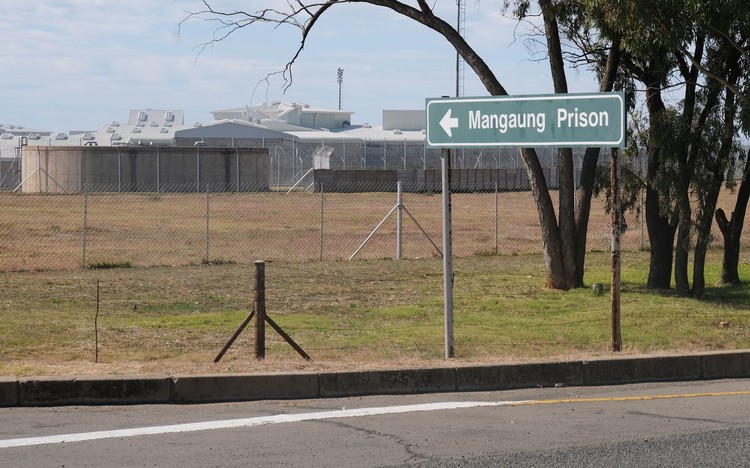Mystery surrounds black empowerment gains from G4S prison contract
Dividends were supposed to address needs of local community
The multi-billion-rand contract for the building and running of Mangaung Correctional Centre was supposed to benefit the community of Bloemfontein. But 20 years after it was signed by the Department of Correctional Services and a private company, Bloemfontein Correctional Contracts, very little is known about any benefits to the community. Archive photo: Becker Semela
- The multi-billion-rand contract for the running of Mangaung Correctional Centre was supposed to benefit the Bloemfontein community but appears mainly to have benefitted multinational security company G4S.
- The activities and profits of G4S’s black empowerment partners and a “community trust” that was supposed to empower the community are shrouded in secrecy.
- The contract costs the government R45-million a month and has cost about R8-billion to date.
Some of the profits from the R1.8-billion contract to build and manage the Mangaung Correctional Centre, made notorious by the high-profile escape of Thabo Bester, were supposed to be used to develop the community of Bloemfontein. But though the price of the contract has soared to nearly R10-billion since it was signed in 2000, there is little evidence that this has happened.
In 2000 the government signed a contract with a private company, Bloemfontein Correctional Contracts (BCC), to build and operate a private maximum-security prison in Bloemfontein. The terms of the contract and the full shareholder list of BCC have never been revealed. But according to the Department of Correctional Services there are five main shareholders, including three black empowerment partners, each of which owns an equal share of the company.
One of those partners is a community trust, mandated to run projects to uplift the community of Bloemfontein. But apart from a relatively small education project, there is no evidence to suggest that much has been done to achieve that goal.
The escape in May 2022 of convicted rapist and murderer Thabo Bester from the prison, 28 km from Bloemfontein, thrust the prison into the public eye and the government is now moving to end the contract.
At the time it was signed, the contract between the Department of Correctional Services and BCC was projected to cost R1.8-billion. This included R300-million to build the prison, and R1.5-billion to operate the prison for 26 years, after which it was to be handed over to the department.
But the cost of the contract has soared, at a rate higher than inflation, since then. In April 2023, the Department told Parliament that it had paid R7.8-billion to BCC since the start of the contract and expected to pay another R2-billion until the end of the contract in 2026. Justice Minister Ronald Lamola told Parliament that the department was facing affordability constraints in meeting its contractual obligations.
Multinational security company G4S owns about 20% of BCC and also has a contract with BCC to manage the prison. Every month the department pays R45-million to BCC for the running of the prison. This covers the running of the prison by G4S and other sub-contractors who provide catering and health services.
But like the other aspects of the deal, details of the management contract with G4S and how much G4S has profited from the contract, are shrouded in secrecy.
Although G4S has recently attempted to distance itself from BCC, referring to itself as a non-controlling “minority shareholder”, the company indisputably has intimate ties to BCC.
For example, one of the directors of BCC is Cobus Groenewoud. He has also been with G4S since 2016, according to CFO South Africa, previously as regional finance director for G4S Africa and since 2021 as regional commercial director of G4S Africa. Groenewoud testified on behalf of both G4S and BCC during the recent parliamentary inquiry into Thabo Bester’s escape.

Cobus Groenewoud is both the regional commercial director of G4S Africa and the director of Bloemfontein Correctional Contracts. Photo from CFO South Africa (fair use)
Empty promises of black empowerment
The five key shareholders of BCC each own about 20% of the company. Apart from G4S, they are: Old Mutual and three black empowerment companies - Ten Alliance Mangaung, Fikile Mangaung and Ikhwezi Community Trust. These three companies were registered shortly before the contract was signed.
Bloemfontein Correctional Contracts told Parliament in 2004 that the Ikhwezi Community Trust had been established “as a vehicle for identifying needs in the local community and using the dividends generated by the company, to address these needs”.
Parliament was told that Ikhwezi Community Trust would have a “budget” of R225,000 a year to run projects with three main focus areas: education and training, small business development, and socio-economic development. These projects were supposed to run for “at least two years”.
But whether they did, and whether Ikhwezi Community Trust has received dividends from profits made by BCC is not clear.
Ikhwezi Community Trust is called a “Trust”, but it is registered as a Proprietary Limited Company. Trusts are supposed to be registered with the Master’s office and have a board of trustees and a list of beneficiaries.
GroundUp asked the Ikhwezi Community Trust whether there is a registered trust that receives profits from Bloemfontein Correctional Contracts, and how the company uses its money to uplift the Bloemfontein community. They did not respond.
On two occasions, G4S has also mentioned the Ikhwezi Community Trust in its Social Responsibility reports. In 2010, G4S paid the salaries of 20 teachers to offer extra maths and science lessons to school children during the winter holidays and presented manual skills training to 225 learners. G4S’s 2010 report also mentions a weekend extra class program run by Ikhwezi Community Trust.
Asked whether the company plays any role in overseeing Ikhwezi Community Trust spending, a spokesperson said that “G4S does not control or have any oversight over the Ikhwezi Community Trust, as it is not a trustee, and nor does G4S have any involvement in trustee appointments”.
We also asked the National Treasury and the Department of Correctional Services whether they play a role in overseeing the “Trust”. The National Treasury declined to comment and the Department of Correctional Services did not respond.
How the other empowerment partners in the consortium have benefitted from the contract is also unclear.
The directors of Ten Alliance Mangaung are Pappie Mokoena, who was mayor of Mangaung between 2000 and 2005 and again briefly in 2023, and his brother, Lebogang Mokoena, a businessman who once sat on the board of Bidvest. Pappie Mokoena is also the sole director of Ikhwezi Community Trust.
Fikile Mangaung is linked to the Fikile family, which owns several companies that do business with the government. Fikile Mangaung participated in the construction of the prison.
The full shareholding of Bloemfontein Correctional Contracts and its empowerment partners is also unknown. Although Parliament was told in April 2023 by both G4S and the Department that each of the five main shareholders owned 20% of BCC, GroundUp has ascertained that there are other smaller shareholders too. These include the Consolidated Retirement Fund for Local Government.
In 2009 and 2010, former COPE MP Hidagrade Ndude declared that she was a shareholder of Bloemfontein Correctional Contracts and Ten Alliance Holdings (the holding company of Ten Alliance Mangaung).
The profit and loss accounts and balance sheets of BCC are not public and attempts by GroundUp to get information from BCC, Pappie Mokoena, G4S, National Treasury, and the Department of Correctional Contracts were unsuccessful.
In the early 2000s, the Institute for Security Studies wrote a report foreseeing future problems with the long-term financing agreement and the lack of an independent regulatory agency.
The report also recommended that the concession contract be released publicly. But 20 years later the contract is still confidential.
Support independent journalism
Donate using Payfast

Next: Mamelodi shack dwellers won’t get promised houses anytime soon
Previous: Zimbabweans at Beitbridge border sceptical about elections
© 2023 GroundUp. This article is licensed under a Creative Commons Attribution-NoDerivatives 4.0 International License.
You may republish this article, so long as you credit the authors and GroundUp, and do not change the text. Please include a link back to the original article.
We put an invisible pixel in the article so that we can count traffic to republishers. All analytics tools are solely on our servers. We do not give our logs to any third party. Logs are deleted after two weeks. We do not use any IP address identifying information except to count regional traffic. We are solely interested in counting hits, not tracking users. If you republish, please do not delete the invisible pixel.

